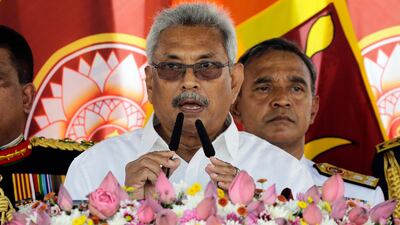Every day for nearly three years, the family members of individuals gone missing during Sri Lanka’s 26-year-long civil war have gathered to light candles in solemn vigil. Yesterday, an announcement from President Gotabaya Rajapaksa, who has held the position since November, extinguished their flames, and their hopes, for good. Sri Lanka’s missing, who are drawn primarily from the country’s Tamil minority and number some 20,000, have been formally acknowledged by the government to be deceased.
To many Sri Lankans, as well as the international community, these revelations might be unsurprising. Sri Lanka’s civil war ended in 2009. But hundreds if not thousands of families maintained hope that their loved ones remained alive, perhaps in camps or secret prisons, or even as conscripts in the armed forces, as Mr Rajapaksa had previously suggested. For them, the news has brought the sense of shock and horror that, in such tragic circumstances, inevitably precede closure.
The circumstances of the deaths, however, remain murky, and Mr Rajapaksa has yet to disclose additional details. The president, who served as defence minister while his brother was president during the civil war, is a controversial figure in Sri Lanka. He is hailed by the country’s majority Sinhalese population as a national hero who ended the war, and revered as the strongman that Sri Lanka needs in the wake of the bombings that struck the island nation last Easter, taking more than 250 lives. But the view of him among many in the Tamil community is coloured by the civil war’s more egregious abuses. A total of 100,000 people were killed during the conflict, 40,000 of them during the Rajapaksa brothers’ time in office. With yesterday’s announcement, the 20,000 missing have been added to the toll. Both sides of the conflict are accused of human rights violations, and the UN has pushed for the government to establish a tribunal to investigate war crimes. More than a decade on, no such tribunal has materialised.
Sri Lankans on all sides, both in their home country and the global diaspora, are owed the truth. And Colombo owes itself a dignified investigation, and to help families come to terms with what happened. This is an opportunity not only to bring real justice to bereaved families, but to afford future generations of Sri Lankans the ability to learn from a harrowing past, especially at a time when renewed violence is threatening to set the island against itself once again.
Disappearances in times of war is an issue that affects millions around the world, long after conflicts are formally resolved. In the Middle East, thousands of Lebanese are still missing, some since the early days of the country’s civil war in the 1970s, and tens of thousands of Syrians have vanished in the ongoing conflict. Up to one million Iraqis are also estimated to be missing since the days of the Iran-Iraq war in the 1980s. There is growing recognition of the scale of the problem.
Last year, the UN Security Council passed its first ever resolution on the issue, urging member states to take strong steps to prevent such disappearances. The decision was drafted by Kuwait, where the families of 300 people who went missing during the Gulf war are still looking for answers.
The families of missing Kuwaitis, Sri Lankans, Lebanese, Iraqis and so many others deserve answers after years of strife. Sri Lanka, along with the rest of the world, must remember that these families are casualties, too. Their loved ones are gone without a trace; but without proper closure, the trauma may never disappear.

